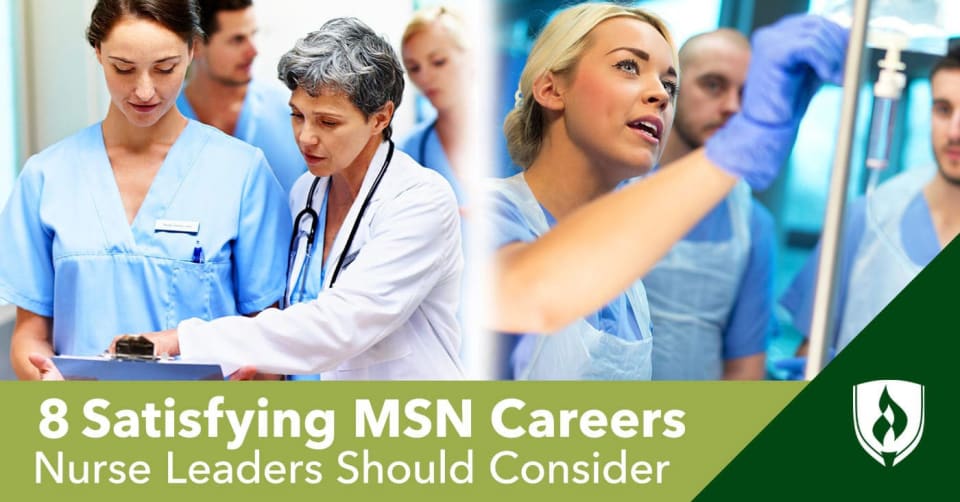
You’ve been working as a nurse for a while. You see yourself as a leader in your unit, and you’re willing to take that next step to become an even better one.
You know that a Master of Science in Nursing (MSN) degree can expand your knowledge base and potentially lead to additional career opportunities. But you’re still curious about the types of nursing jobs you can qualify for with an MSN.
To help answer that, we asked Dr. Joan Rich, vice president of nursing at Rasmussen University, to provide more information.
What can you do with a master’s degree in nursing?
Graduate-level nursing degrees can open the door to quite a few career paths, depending on their focus areas. Some focus more on preparing nurses for advanced direct care roles with broadened scopes of practice, while others supplement nurses’ patient care abilities with specialized administrative and training skills.
The Rasmussen University Master of Science in Nursing program offers three MSN non-clinical specialization paths: Nursing Leadership and Administration, Nursing Education, and Healthcare Technology, Simulation and Informatics. Rasmussen University’s MSN program also offers students the ability to specialize in one of four Nurse Practitioner tracks: Psychiatric-Mental Health Nurse Practitioner, Adult Gerontology Primary Care Nurse Practitioner, Pediatric Primary Care Nurse Practitioner and Family Nurse Practitioner.
Nursing Leadership and Administration students focus more on the business side of nursing and healthcare, developing the leadership, management and administration skills they’ll need to transform healthcare in their workplace.
The Nursing Education track is for those who are passionate about educating the current and next generation of nurses. On top of the advanced knowledge of pharmacology, pathophysiology and patient assessment found in all MSN tracks, they’ll gain knowledge of curriculum design and teaching strategies.
The Healthcare Technology, Simulation and Informatics track is for those seeking to supplement their patient care skills with an advanced knowledge of the technologies used to drive change in healthcare.
The Nurse Practitioner route is best for established RNs who want to continue to care for patients as an Advanced Practice Registered Nurse (APRN). Rasmussen’s program specialization options provide students the academic and clinical training needed to assess, diagnose and create treatment plans for patients in their respective focus areas. Additionally, graduates will be prepared to sit for the national NP board certification exam associated with their chosen specialization.
What can you do with an MSN: Careers in Nursing Education
“Really, all nurses are educators,” Dr. Rich says.
You know this from experience—nurses are often the point person for educating patients and families on medical conditions, new medications and upcoming procedures. If you find teaching patients rewarding, it’s easy to imagine how gratifying teaching student and current nurses could be. The Nursing Education MSN specialization can help prepare you with both advanced nursing knowledge and the skills needed to be an effective educator.
If you’re considering embarking on this track, you’ll be happy to hear that nurse educators are in demand. The Bureau of Labor Statistics projects that 276,800 new registered nursing jobs will be created from 2020 through 2030.1 These nurses don’t appear out of thin air—they’ll need educators to help train the next generation of nurses in order to meet this demand.
“Nationally, we’re short nurse educators,” says Dr. Rich. “We need to get more nurses into education, or we’ll have no one else [who can] teach.”
If you’re passionate about lifelong learning and educating the current and next generation of nurses, nursing education could be the right fit for you.
So what can you expect to learn? In addition to core courses, you’ll take the following courses for your education specialization:
- The Role of the Nurse Educator
- Curriculum Design and Program Evaluation
- Nursing Education in the Classroom
- Nursing Education in the Clinical Setting
If those classes sound like they’ll lead you where you want to go, let’s take deeper dive at some of those nursing education job titles they could prepare you for.
1. Nurse educator
Nurse educators generally work in an academic setting at the collegiate level playing a pivotal role in preparing student nurses for their futures. Nurse educators typically serve as a member of the faculty at a college or university. In order to maintain their high level of clinical expertise, many nurse educators teach part-time while working full-time in a hospital, clinic or specialty center.
Nurse educators are responsible for designing, teaching and evaluating nursing curriculum and courses. They engage in scholarly work and participate in professional associations for nurses and nursing education.
With all that responsibility, nurse educators must be experienced clinical nurses with advanced education. At a minimum that means earning an MSN to get started—and you may want to consider advancing your education even further from here for a strictly academic career.
Teaching isn’t easy though. Unlike a standard nursing role, you don’t get to leave work behind when you’re off the job site. Teaching often means answering emails whenever your students need you and it may not be as financially lucrative as other nursing positions—so dedication to this important role is key.
“You really have to have a passion for educating the next generation of nurses,” says Dr. Rich.
2. Clinical director of education
Unlike nurse educators, directors of education work in the clinical setting. Sometimes called clinical educators or directors of clinical education, you’ll find one in nearly every clinic or hospital, especially those with robust clinical and residency programs.
They’re responsible for rolling out education to all the different disciplines they have students or residents in—this can include current and student nurses, interns, residents, medical students and student medical assistants. This often means developing training around topics like clinical skills, processes, policies and other topics. They work with clinical mangers to determine what kind of education is needed and implement the highest standards of care within the training.
If you’d like to learn more about the details of this role, check out our article, “What Does a Clinical Educator Do? A look at the Nurses Guiding the Next Generation.”
What can you do with an MSN: Careers in Nursing Leadership and Administration
For the ambitious nurses who are driven to transform their workplaces, a Nursing Leadership and Administration specialization may be the right fit. The combination of their clinical experience and this additional training is what will give students the ability to understand and influence policy and budget.
“Students may be wonderful bedside nurses, which is certainly something we need, but we also need the additional critical thinking abilities of graduate-level nurses,” Dr. Rich says. “These nurses are leaders who want to transform their healthcare institutions, shape policy and understand the big-picture budget better.”
On the Nursing Leadership and Administration track, you can gain the business savvy you’ll need to understand and influence healthcare change at a higher level, manage your unit more effectively and apply to executive positions within healthcare.
In addition to core courses, you’ll find the following topics covered in the Nursing Leadership and Administration specialization path:
- Advanced Nursing Leadership
- Meaningful Communication and Collaboration
- Leadership and Management in Advanced Nursing Practice
- The Business Side of Nursing
So where could this blend of hands-on nursing skills and administrative know-how take you? Let’s take a look at the job positions this specialization path aims to prepare you for:
3. Nurse manager
Nurse managers straddle the worlds of both staff and management. Though they work daily with bedside nurses, many of their duties are managerial. They motivate staff, lead meetings, and oversee recruitment, scheduling and the budget. These nursing professionals are the leaders willing to advocate for all nurses while mentoring and empowering their staff. Leadership ability is key for these roles—they’re the ones staff nurses turn to in order to work through conflicts and must be a steadying force during emergencies or other turbulent situations. They also provide support to all their staff and the patients and their families in their unit.
You’ll find a nurse management position wherever there is a staff of nurses—from hospitals to doctors’ offices and specialty clinics. Nurse management positions typically require years of hands-on nursing experience and a bachelor’s degree at a minimum. That said, an MSN can help demonstrate you have the drive and skills to handle the additional managerial and administrative duties of this role.
If you’re able to balance administration duties while still playing a crucial role in the work of bedside nurses, you’ll make a strong a nurse manager.
4. Director of nursing
Within the hierarchy of a hospital or health system, a director of nursing typically reports to the chief nursing officer and oversees an even larger share of administrative duties as they lead and assist staff nursing management teams.
This means their work tends to focus on “big picture” topics within a facility’s day-to-day nursing work. This can include overseeing regulatory compliance, budgeting, staff training and educational requirements, or maintaining inventory and implementing infection control measures. It should be noted that these duties can vary depending on the size and nature of the healthcare facility. This position may also be called a director of nursing services or a director of patient care services.
A director of nursing must be a leader with a great deal of compassion and professionalism. They need to be able to communicate clearly and easily to help the team become more unified and effective. As you might expect, this position typically requires nursing management experience.
5. Chief nursing officer
Chief nursing officers represent nurses at the executive level, advising executives and other institutional leaders on best nursing practices, nursing wages and budgets. They also manage relationships between physicians and nurses while overseeing compliance with government regulations and internal hospital policies.
Chief nursing officers work for hospitals or entire health systems. Since there’s usually just one position per hospital or health system, competition for the position among nursing administration can be fierce. Working as a chief nursing officer is an ambitious goal that will require extensive effective management experience—likely at a director level—and the academic qualifications to match.
What can you do with an MSN: Careers in Healthcare Technology, Simulation and Informatics
Technology is rapidly transforming how nurses learn about, track and adapt to the needs of their patients. This specialization allows MSN students to focus their attention on the systems and skills needed to further the nursing profession with emerging technologies like virtual simulations, healthcare informatics systems and more.
This specialization track includes the following courses:
- Healthcare Technology
- Simulation in Healthcare
- Informatics in Advanced Nursing Practice
- Integrating Technology
This technology-focused specialization path can help prepare you for roles like:
6. Nursing informatics specialist
Technology is obviously capable of creating powerful tools for healthcare providers, but a tool is only as effective as the people using it! That’s where nursing informatics specialists come into play. These nursing professionals draw on their patient care background to help with the design, development and implementation of technology systems used by healthcare providers.
The day-to-day details of this role will vary depending on the needs of the healthcare system, but in an informatics specialist role you may find yourself training nursing staff on how to best use electronic health records systems. Or you may focus your time on assisting with the design of technology systems to help ensure they’re a practical fit for meeting the needs of all stakeholders. Informatics specialists may also have the opportunity to use the data gathered through these healthcare technology systems to inform plans or initiatives to improve patient care and overall efficiency.
7. Nursing simulation coordinator
Healthcare simulation technologies and labs play an important role in the training and education of nurses. Nursing simulation coordinators are typically employed by either educational institutions or healthcare facilities that use simulated lab resources to train and educate healthcare workers. Professionals in this role are tasked with overseeing and managing the needs of a simulation lab.
This can include ensuring equipment is maintained and in good working order, overseeing software and hardware updates, maintaining lab inventory, and coordinating the set up and preparation of simulated lab scenarios. Depending on the facility, you may work with multiple departments to coordinate and plan for their simulation training needs.
What can you do with an MSN: APRN Careers
For caring registered nurses interested in staying in a clinical role but wanting to take their autonomy and scope of practice to the next level, a career as an APRN may be the right fit. APRNs tackle a wide variety of nursing roles including:
- Certified registered nurse anesthetist (CRNA)
- Nurse practitioner (NP)
- Certified nurse-midwife (CNM)
- Clinical nurse specialist (CNS)
While APRNs can choose to earn a Doctor of Nursing Practice (DNP) in the specialty of their choice, an MSN is the most common education path. Let’s take a closer look at one common APRN role: the nurse practitioner.
8. Nurse practitioner (NP)
Nurse practitioners are a type of advanced practice provider who works (with physician oversight) to assess, diagnose and devise treatment plans for patients. The additional training, education and clinical experience required for licensure as a nurse practitioner positions these providers for taking on an advanced scope of practice. This can be an appealing fit for registered nurses looking to expand—and adjust—their role in directly caring for patients.
Unlike undergraduate-level nursing where graduates often choose to pursue specialization options after graduation and transition to new specialty units with relative ease, nurse practitioners typically enroll in programs that focus on a specific specialty track. Options include programs for becoming a Family NP, Pediatric Primary Care NP, Adult-Gerontology Primary Care NP or Psychiatric-Mental Health NP, among others.
While it is possible to change specialty focus areas as an NP, there may be additional education or training requirements to do so. This makes having a clear idea of where you’d like to focus your practice an important consideration, and many NPs use their time as a registered nurse to explore these options.
Take your passion for nursing to the next level
Now that you have a clearer idea of what you could do with a Master of Science in Nursing degree from Rasmussen University, are you ready to learn more? Our article, “8 Things You Didn’t Know About the Rasmussen University MSN Program” will give you an in-depth preview of what to expect.
1Bureau of Labor Statistics, U.S. Department of Labor, Occupational Outlook Handbook, Most New Jobs [accessed November 2022] https://www.bls.gov/ooh/most-new-jobs.htm Salary data represents national, averaged earnings for the occupations listed and includes workers at all levels of education and experience. This data does not represent starting salaries. Employment conditions in your area may vary.




